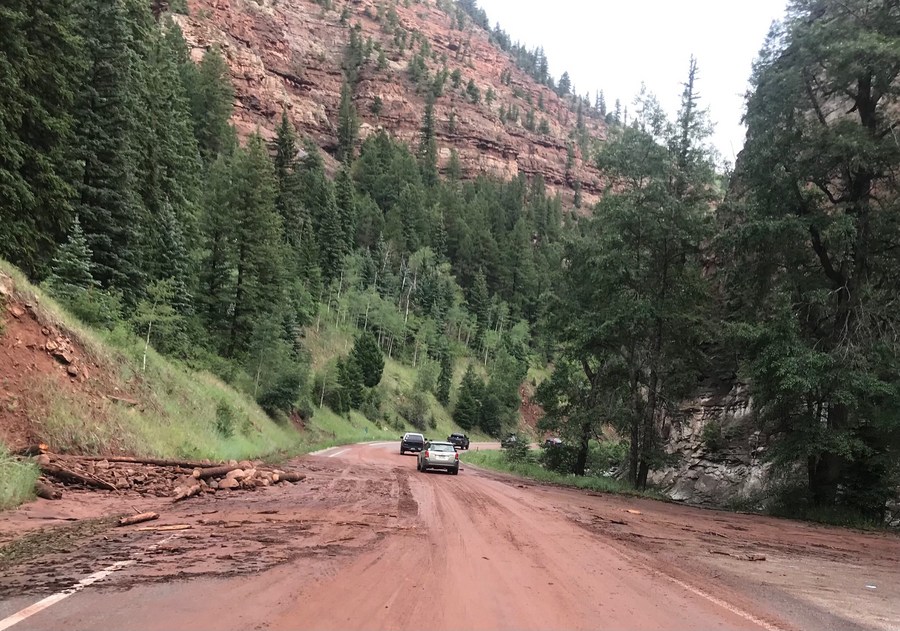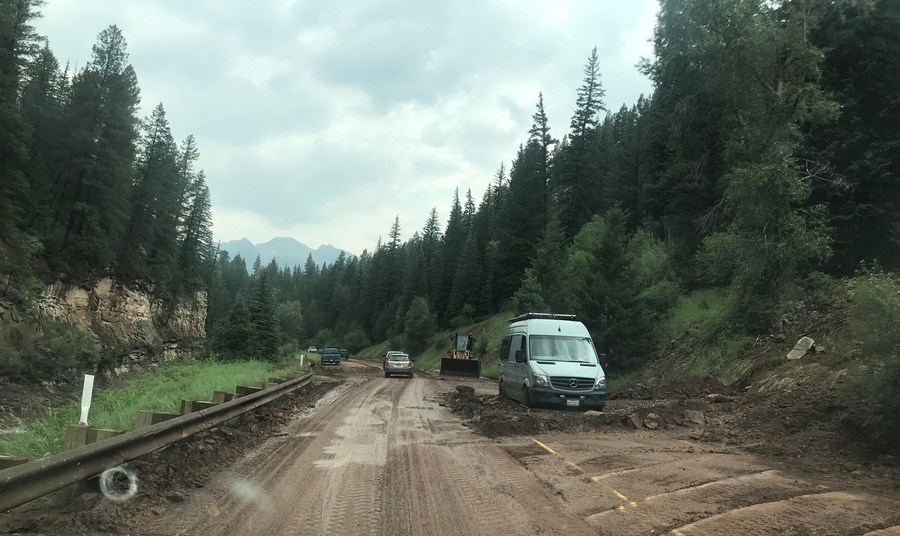
CO Hwy 133 is seen covered with mud after a mudslide, south of Redstone, Colorado, the United States, on July 25, 2021. (Photo by Peter Mertz/Xinhua)
Within a week, the U.S. state of Colorado was hit by record-high temperatures, as well as massive mudslides, coupled with flash floods claiming lives.
by Peter Mertz
DENVER, the United States, July 30 (Xinhua) -- Colorado's unpredictable 2021 summer weather showcased an extraordinary week, where record hot temperatures were recorded on the state's flat eastern half, while monsoon-like weather in the mountains triggered record numbers of mudslides.
"Two times in one week, hard to believe," said Denver resident Joe Sinisi Friday, referring to two different mountain highways being closed two different times from massive mudslides.
Sinisi travelled into the mountains Thursday to camp at Bogan Flats campground near Redstone, Colorado, but was delayed by mudslides in Glenwood Canyon, where Interstate 70 was closed, and in another canyon on CO Hwy 133 just south of his campground.
Colorado Department of Transportation (CDOT) crews are so busy cleaning trees, rocks and mud off roadways across the state that they just posted numerous "highway maintenance" job positions on the state's employment website, ConnectingColorado.com.
"Summer monsoon moisture that has been trapped on Colorado's western slope will move east," CBS4 Denver reported Friday. The National Weather Service (NWS) is "anticipating a deluge of rain in some areas," it said.
The NWS issued a flash flood watch Friday through Saturday evening across a vast stretch of the centennial State, including most of the mountains and even the state capital Denver.

CO Hwy 133 is seen covered with mud after a mudslide, south of Redstone, Colorado, the United States, on July 25, 2021. (Photo by Peter Mertz/Xinhua)
"As much as 2 to 3 inches of rain could fall in some spots this weekend or much of it could fall in a short period of time due to slow moving storms," 9News said on Friday. "That's unfortunately a good recipe for flash flooding."
VICTIMS
With ground tables already saturated, local officials are taking extreme precautions after flash floods in northern Colorado claimed lives.
Just one week ago, "a flash flood rushed down the Cameron Peak fires burn scar and surprised a Wisconsin family who had been vacationing in Colorado for 27 years," according to the Denver Post.
"The bodies of two men and one woman have been recovered after floodwaters swept through Poudre Canyon," KMGH-TV reported Tuesday.
The NWS's latest "flash flood threat" area covered hundreds of square kilometers in Colorado, the entire Rocky Mountain range, and the western half of the state from Denver to the Utah border.
"The biggest threat for flash flooding is over the burn scars including the Cameron Peak, East Troublesome, Williams Fork and Calwood fires, that have an elevated threat for flash flooding and mudslides," the NWS said Friday.
The Grizzly Creek fire started in August 2020 in Glenwood Canyon and burned more than 32,000 acres (129.5 square kilometers) of the scenic canyon.
On Friday, the entire burn area remained under a flash flood warning through the weekend, the NWS said.
Two separate times - exactly one week apart - CDOT shut down I70 through Glenwood Canyon due to flash flooding in the Grizzly Creek scar burns area.
Thursday night, at least 20 people were trapped in their vehicles in Glenwood Canyon on I70, until they could be escorted out, according to the Garfield County Sheriff's office.
I70 is the main artery for ground transportation running east to west 360-miles across the Centennial State and had been closed several times in June and July after mudslides covered the roadway, sometimes trapping vehicles between slides, The Weather Channel said.
"Avoid traveling to or through the burn scars. I70 at Glenwood Canyon will have a very high risk of closure through the weekend," 9News Denver said.
I70, a famous American highway, stretches 2,171 miles (3,493 kilometers) from Baltimore, Maryland into Utah, is the only mode of travel through Colorado's Rocky Mountains.

CO Hwy 133 is seen covered with mud after a mudslide, south of Redstone, Colorado, the United States, on July 25, 2021. (Photo by Peter Mertz/Xinhua)
One week ago, a massive debris flow in Glenwood Canyon closed the interstate in both directions for two days, the longest such closure on record.
COLORADO UNIQUE
Thus far in 2021, the states of California, Oregon and Washington had been devastated by more than 100 large fires, according to Inciweb, the Interagency Command Center, but not the Centennial State.
Last year Colorado joined its far western neighbors by having the worse wildfire season in its history, with the three largest fires ever torching more than 400,000 acres (1,618.7 square kilometers) of land, Inciweb said.
But 2021 has been a different story, with unexpected, early monsoon weather dampening forests, to the delight of fire officials, who remember 2020 as the year the annual August monsoon showers "never happened."
None expected the monsoon season to arrive a month early, but it has, with a week of steady nightly rain seen throughout the Rockies, especially at higher elevations, according to weather observers in Marble, Colorado.
To the east, the state capital would downshift from a week of record high temperatures into the "moisture trapped in the mountains that will hit the city this weekend," the Weather Channel reported.
Friday, as Denver residents prepared for another sweltering day, a "short cold front will drop into eastern Colorado on Friday evening bringing some surface moisture with it," the Weather Channel said.
That will combine with "monsoon moisture at the middle and upper levels of the atmosphere which has been mostly stuck in the mountains most of the week, to bring tons of moisture," it added.
On Wednesday, the Centennial State Capitol Denver recorded a fifth day this year above 100 degrees Fahrenheit (about 37.8 degrees Celsius), tying a record.
The only other years to have five or more 100-degree days in a single year are 2018, 2012, 2006 and 1936. Denver weather records date back to 1872.
Denver averages less than one 100-degree day per year, based on long-term observations dating back to 1872.
Also, Denver's daily record of 98 degrees Fahrenheit (about 36.7 degree Celsius) was broken on Wednesday as well. That record dated back to July 28, 1876 - just four days before Colorado officially gained statehood. ■




